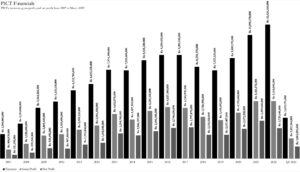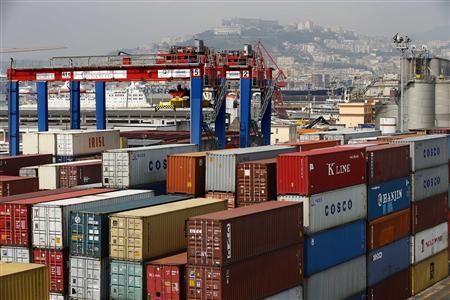On Friday, 7th July, Pakistan International Container Terminal (PICT) announced, in a notification to the Pakistan Stock Exchange (PSX), that its concession agreement with the Karachi Port Trust (KPT) had officially expired on 17th June. In the notification, PICT reiterated its stance and stated that it is exploring legal options.
However, PICT acknowledged that the termination of the agreement marks the end of its operations at Karachi Port and is now collaborating with KPT to hand over the premises.

Who is PICT?
PICT was established as part of a $33.8 million project (Rs 9.7 arabs at a spot rate of $1: Rs 287) to establish a common user container terminal on Berths 6 – 9 of Karachi Port. This was accomplished under a 21-year Implementation Agreement between the Trustees of the Port of Karachi and Premier Mercantile Services on a Build-Operate-Transfer (BOT) that was signed in 2002. This lapsed on June 17.
During the course of its operations, PICT generated Rs 123.1 arab in turnover, Rs 56.397 arab in gross profit, Rs 31.855 arab in net profit.
Why is PICT reminding the PSX of its contract lapsing?
KPT assumed control of the terminal on June 17, but permitted PICT to continue operating as its service agent without charging any fees until 30 June. This arrangement was a makeshift one until the terminal was handed over to the next party?
Who is replacing PICT?
The company in question is Abu Dhabi Ports Group. The Abu Dhabi Ports Group (AD Ports Group) is the exclusive developer and regulator of ports and related infrastructure in Abu Dhabi. It was established in 2006 and is owned by Abu Dhabi Developmental Holding Company (ADQ).
ADQ itself is an investment vehicle for the government of the UAE. AD Ports is thus owned indirectly by the government of the UAE through its ownership by ADQ. AD Ports has five integrated business clusters: Digital, Economic Cities & Free Zones, Logistics, Maritime, and Ports.
AD Ports came to Pakistan along with another Emirati company called Kaheel Terminals on 18th of May to sign a memorandum of understanding with KPT about the future of the terminal. Both of these companies entered into a JV which is now the KGTL which will manage Karachi’s port terminals. KGTL claimed that it will spend the next 10 years developing the port terminals and increasing its capacity. Overall, the immediate investment coming into Pakistan would be worth over $220 million.
Why is PICT ruminating on legal options in the notification?
The company hints at particular sections of its financial reports for its stance on the transaction. The particular sections state the following: “The Company is currently in negotiations with KPT for finalizing the terms and conditions for operating during the intervening period. Moreover, the Company is committed to exercise the right of first refusal whenever granted by the KPT for exercising. Accordingly, the condensed interim financial statements for the quarter ended March 31, 2023 are prepared on a going concern basis subject to inherent uncertainties caused by events and conditions as disclosed in Note 2.3 of these condensed interim financial statements”.
A right of first refusal (ROFR) is a contractual right that gives its holder the option to enter a business transaction with the owner of something, according to specified terms, before the owner is entitled to enter into that transaction with a third party¹². This right can apply to various situations, such as real estate, business deals, or employment contracts. The holder of this right can either accept or decline the offer, but if they decline, the owner is free to negotiate with others. In essence, PICT’s ROFR allowed it to match any bid made by Abu Dhabi Port Group for the terminal.
However, as the Government of Pakistan utilized the Inter–Governmental Commercial Transaction Act (2022), the ROFR was circumvented entirely. Profit has covered this aspect in detail in an article previously.
However, as for now, PICT is no more the managing authority of berths 6 to 9. The notification confirms them extricating themselves from the operations.


























Respected ALL in Islamic Republic of Pakistan 🇵🇰
The Noble Qur’ân:
#Meet Your Promises/ Agreements and Do JUSTICE ⚖️ in Line with Allâh’s LAWS, with Fear of Allâh (SWT)
Allâh (SWT) Loves GOOD Doers and Justice ⚖️
A Believer and An Ambassador of Islamic Republic of Pakistan 🇵🇰 Matlab🇸🇦 🤲
hello
yas
Given the dynamic nature of the market, the emerging legal and regulatory climate, and the sheer volatility of crypto assets, it can be a daunting task to get your crypto currency back once you have fallen victim to one of the numerous crypto currency related schemes out there. If you have been defrauded with crypto currency the road to getting your crypto currency back can be a very tedious one, particularly since most people don’t have the best knowledge of how crypto currency works. If you fall into that category my advice to you would be to follow the following steps:
How to Recover Crypto currency
* Contact a professional recovery expert ([email protected])
* Provide detailed information about the theft (wallet addresses, amount stolen, and time of theft).
* Wait for the stipulated recovery time.
* Check your wallet for your crypto currency chargeback.
This was how I was able to recover my lost Bitcoin of about 189kUSD.
What will happen to PICT shareholders?